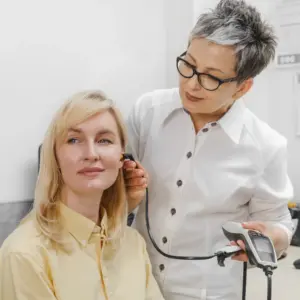Top Vitamins for Hearing Health
Hearing health matters, and while there’s no easy fix for hearing loss, some vitamins may help protect your ears. But do vitamins for hearing really work? Let’s delve into what science says and explore how you can support your hearing health.
Talk To Your Doctor First
Before you rush to the supplement aisle, talk to your healthcare provider. They can guide you on your specific needs and how vitamins might interact with your medications.

Key Vitamins for Hearing Health
While no single nutrient promises to cure or fully prevent hearing loss, a combination of certain vitamins may play a crucial role in supporting ear health and overall auditory function. Let’s delve into what studies show as the potential benefits of these key vitamins.
-
Vitamin A:
This vitamin is vital for maintaining healthy cells throughout the body, including those in the inner ear responsible for hearing. It supports the ear’s ability to translate sound waves into electrical signals for the brain. However, it’s important to note that excess vitamin A intake can lead to toxicity, underscoring the importance of consulting with a healthcare provider before starting any supplementation.
-
Vitamin C:
Renowned for its antioxidant properties, vitamin C helps combat oxidative stress—a factor that can contribute to hearing loss. By neutralizing free radicals, vitamin C may help protect the delicate structures of the inner ear, although direct links to improved hearing are still under research. It’s a reminder of the intricate balance between antioxidants and ear health.
-
Vitamin E:
Similar to vitamin C, vitamin E is an antioxidant that may help shield the inner ear from damage caused by oxidative stress. Its protective qualities suggest a potential for supporting ear health, yet concrete evidence directly linking vitamin E to improved hearing outcomes is pending further studies.
-
Vitamin B12:
An essential nutrient affecting various bodily functions, vitamin B12 deficiency has been associated with hearing difficulties. While supplementation may not provide direct benefits to those without a deficiency, ensuring adequate levels of vitamin B12 is crucial for overall health, including auditory wellness.
-
Magnesium:
Intriguingly, magnesium plays a role in nerve function and has been studied for its potential impact on the auditory system. It might help protect against noise-induced hearing loss by supporting the cells within the inner ear, though the extent of its benefits awaits confirmation from further research.
A Balanced Approach to Vitamins for Hearing Health
When considering these vitamins for hearing health, the emphasis should be on achieving a balanced and varied diet. Natural food sources rich in these nutrients not only contribute to ear health but also support a wide range of bodily functions. For those contemplating supplements, a discussion with a healthcare provider is essential to tailor advice to individual health profiles and needs.
Explore here to learn, “What is hearing health?”
Diving Deeper into Additional Nutrients for Hearing Health
In addition to the key vitamins previously discussed, other nutrients play significant roles in supporting hearing health. Their potential benefits extend from mitigating risk factors associated with hearing loss to enhancing overall ear function. Let’s explore these nutrients further and understand their place in a hearing health-conscious diet.
-
Folate:
This B vitamin is crucial for cell growth and metabolism, showing a promising connection to hearing health, especially in older adults. Research suggests that higher folate intake is associated with a reduced risk of hearing loss, likely due to its role in circulation and preventing homocysteine accumulation, which can affect inner ear function. Natural sources like leafy greens, legumes, and fortified cereals are excellent ways to incorporate folate into your diet.
-
Omega-3 Fatty Acids:
Found predominantly in fish such as salmon, sardines, and mackerel, omega-3 fatty acids are celebrated for their anti-inflammatory properties. Studies indicate an inverse relationship between omega-3 intake and the risk of age-related hearing loss, possibly due to improved blood flow to the cochlea. Incorporating omega-3-rich foods or supplements, as recommended by a healthcare provider, could support hearing health as part of a balanced diet.
-
Zinc:
This mineral is known for its immune-boosting properties and also may have a role in managing tinnitus, particularly for individuals with zinc deficiencies. Zinc helps maintain cochlear health and auditory pathway function. However, supplementation should be approached with caution, as excessive zinc can interfere with copper absorption. Foods rich in zinc include beef, pumpkin seeds, and lentils.
-
Carotenoids:
Beta-carotene and other carotenoids, with their antioxidant properties, may reduce the risk of hearing loss by combating oxidative stress in the auditory system. Carotenoids, which the body can convert into vitamin A, support the health of the ear’s delicate structures. Colorful fruits and vegetables, such as carrots, sweet potatoes, and leafy greens, are excellent sources.
The Synergistic Effect of Vitamins for Hearing Health
It’s crucial to recognize that these nutrients work best when consumed as part of a diverse and balanced diet. This synergistic approach ensures not only the intake of specific vitamins and minerals beneficial for hearing but also supports overall health and wellness. Before turning to supplements, consider how dietary adjustments can naturally boost your intake of these essential nutrients.
Beyond Vitamins for Hearing Health: Comprehensive Hearing Health Strategies
By prioritizing a diet rich in folate, omega-3 fatty acids, zinc, carotenoids, and magnesium, alongside the key vitamins, you can support your hearing health while fostering overall well-being. Remember, these nutritional strategies should complement other hearing health practices to maintain and enhance your auditory experience.
Adopting a healthy lifestyle is also crucial. Exercise regularly, maintain a healthy weight, and protect your ears from loud noises. Don’t overlook the importance of regular hearing checkups for early detection and management of hearing issues.

Embrace a Holistic Approach to Hearing Health
Vitamins and minerals can play a supporting role in hearing health, but they’re not a standalone solution. Emphasize a healthy lifestyle, protect your ears from noise, and schedule regular hearing evaluations. Call Stanford Hearing to take the first step toward better hearing health with a free hearing evaluation. Remember, taking care of your hearing is an investment in your overall quality of life
